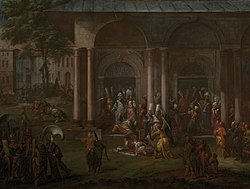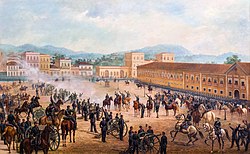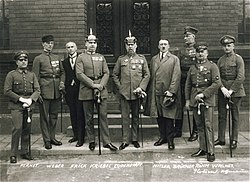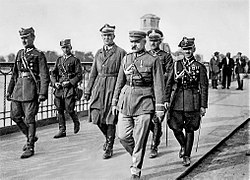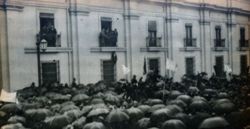This list has no precise inclusion criteria as described in the Manual of Style for standalone lists.(June 2022) |

A coup d'état, often abbreviated to coup, is the overthrow of a lawful government through illegal means. If force or violence are not involved, such an event is sometimes called a soft or bloodless coup. In another variation known as a self-coup, a ruler who came to power through legal means may try to stay in power through illegal means, thus preventing the next legal ruler from taking power. This is a chronological list of such coups and coup attempts, from ancient times to the present.
Contents
- BC
- 1–999
- 1000–1699
- 1700–1799
- 1800–1899
- 1800
- 1804
- 1807
- 1808
- 1809
- 1811
- 1812
- 1815
- 1820
- 1822
- 1823
- 1824
- 1827
- 1828
- 1829
- 1832
- 1834
- 1836
- 1837
- 1839
- 1841
- 1842
- 1843
- 1844
- 1845
- 1846
- 1847
- 1848
- 1851
- 1852
- 1853
- 1854
- 1857
- 1861
- 1864
- 1866
- 1867
- 1868
- 1870
- 1871
- 1872
- 1874
- 1876
- 1879
- 1884
- 1885
- 1886
- 1889
- 1891
- 1893
- 1895
- 1896
- 1898
- 1899
- 1900–1919
- 1900
- 1901
- 1902
- 1903
- 1904
- 1905
- 1906
- 1907
- 1908
- 1909
- 1910
- 1911
- 1912
- 1913
- 1914
- 1915
- 1916
- 1917
- 1918
- 1919
- 1920–1929
- 1920
- 1921
- 1922
- 1923
- 1924
- 1925
- 1926
- 1928
- 1929
- 1930–1939
- 1930
- 1931
- 1932
- 1933
- 1934
- 1935
- 1936
- 1937
- 1938
- 1939
- 1940–1949
- 1940
- 1941
- 1942
- 1943
- 1944
- 1945
- 1946
- 1947
- 1948
- 1949
- 1950–1959
- 1950
- 1951
- 1952
- 1953
- 1954
- 1955
- 1956
- 1957
- 1958
- 1959
- 1960–1969
- 1960
- 1961
- 1962
- 1963
- 1964
- 1965
- 1966
- 1967
- 1968
- 1969
- 1970–1979
- 1970
- 1971
- 1972
- 1973
- 1974
- 1975
- 1976
- 1977
- 1978
- 1979
- 1980–1989
- 1980
- 1981
- 1982
- 1983
- 1984
- 1985
- 1986
- 1987
- 1988
- 1989
- 1990–1999
- 1990
- 1991
- 1992
- 1993
- 1994
- 1995
- 1996
- 1997
- 1998
- 1999
- 2000–2009
- 2000
- 2001
- 2002
- 2003
- 2004
- 2005
- 2006
- 2007
- 2008
- 2009
- 2010–2019
- 2010
- 2011
- 2012
- 2013
- 2014
- 2015
- 2016
- 2017
- 2018
- 2019
- 2020–present
- 2020
- 2020-2021
- 2022
- 2023
- 2024
- 2025
- 2026
- See also
- Notes
- References
- External links



